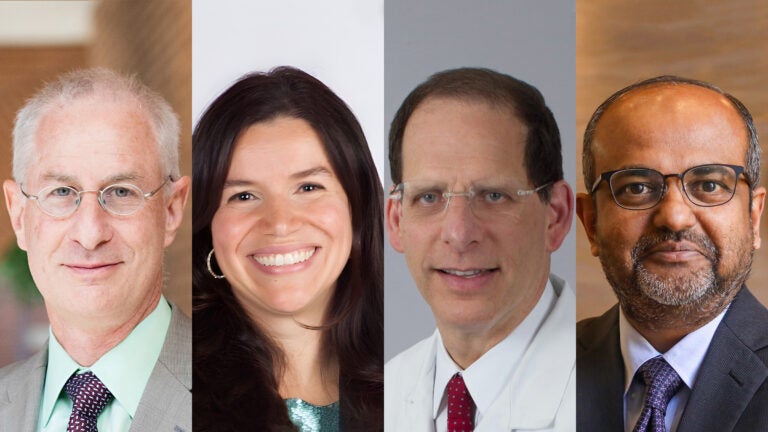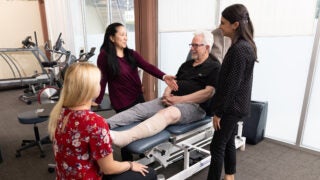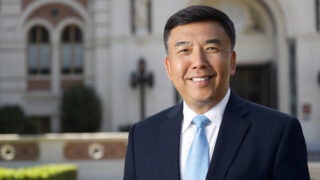
USC’s newest American Association for the Advancement of Science fellows are (from left) Pinchas Cohen, Andrea Hodge, Jay Lieberman and Gaurav Sukhatme. (Photos, from left/Stephanie Davis Kleinman French, Courtesy of USC Viterbi, Ricardo Carrasco III, Cooper Brown)
4 USC faculty members named as fellows of prestigious science organization AAAS
Honorees join more than 40 USC faculty as fellows of the American Association for the Advancement of Science.
The council of the American Association for the Advancement of Science has elected USC faculty members Pinchas Cohen, Andrea Hodge, Jay Lieberman and Gaurav Sukhatme to the ranks of AAAS fellows.
The honor, which recognizes researchers whose “efforts on behalf of the advancement of science or its applications are scientifically or socially distinguished,” is among the most prized in academia.
The recognition honors excellence in research, technology, industry and government, teaching, and communicating and interpreting science to the public. The new cohort joins more than 40 of their USC peers already inducted into AAAS.
The newly elected AAAS fellows will be honored at a ceremony in Washington, D.C., in September.
Pinchas Cohen: Investigating microproteins to improve aging process
Cohen, dean of the USC Leonard Davis School of Gerontology, was named a fellow of AAAS “for distinguished contributions to the fields of aging research and molecular biology, particularly using mitochondrial peptides to study possible therapeutic benefits for diabetes, Alzheimer’s and other diseases related to aging.”
An internationally recognized expert on healthy aging and longevity, Cohen has been the dean of USC Leonard Davis School since 2012. He is a pioneer in the field of mitochondrial microproteins, which are potential therapeutic targets for several diseases related to aging. As dean, Cohen is driving several new initiatives, ranging from technology and innovation for longevity to precision aging, alternative approaches to mental health in aging and the establishment of a Southern California Aging Research Consortium.
He has received numerous awards, including the National Institute of Aging EUREKA Award, the NIH Director Transformative Research Award grant, the Glenn Award for Research in Biological Mechanisms of Aging, and the American Federation for Aging Research Irving S. Wright Award of Distinction.
Throughout his career, Cohen — holder of the William and Sylvia Kugel Dean’s Chair in Gerontology and Distinguished Professor of gerontology, medicine and biological sciences — has published more than 350 papers in top scientific journals focusing on aging, dementia, cancer, diabetes and the emerging science of microproteins. Previously, Cohen held faculty positions at the University of Pennsylvania and UCLA, where he led the Diabetes Research Center.
“I am deeply honored to be named a fellow of AAAS,” Cohen said. “It is a privilege to be recognized by such a prestigious group that is dedicated to pursuing knowledge and improving the lives of all people.”
Andrea Hodge: Creating materials to survive extreme environments
Hodge is the Fluor Professor in Engineering and professor of chemical engineering and materials science and aerospace and mechanical engineering at the USC Viterbi School of Engineering.
Hodge is an expert in the mechanical behavior of engineered materials at the nano- and microscale. She is honored by AAAS for her distinguished contribution in the areas of metallic deposition, metallic foams and nanomechanics, as well as administrative excellence and leadership as vice provost and department chair.
“As a scientist and educator, I am deeply honored to be recognized as a fellow of the AAAS,” Hodge said. “It is a prestigious acknowledgment to join the ranks of so many incredible past and present fellows who are pushing boundaries and advancing science. I am grateful for the ongoing support from my colleagues at USC Viterbi and the Mork Family Department.”
At USC, she oversees the Hodge Materials Research Group, which develops engineered nanomaterials with a focus on the synthesis of micro- and nanoscale structures and structured grain boundaries. The group harnesses a variety of coating techniques to design and produce new nanostructured, microstructured and amorphous materials for advanced applications for extreme environments.
Hodge joined USC Viterbi as an assistant professor in 2007. Between 2016 and 2020 she served as USC vice provost for undergraduate programs, before taking on the role of chair of the Mork Family Department of Chemical Engineering and Materials Science in 2020.
She received her doctorate degree in materials science in 2002 from Northwestern University.
Hodge’s excellence in materials research has been previously recognized with major honors, including a National Science Foundation Faculty Early Career Development award, Office of Naval Research Young Investigator Program award and DARPA Young Faculty Award, as well as The Minerals, Metals & Materials Society Julia and Johannes Weertman Educator Award.
She is an elected fellow of AAAS and the Materials Research Society, and is the co-director of USC’s Materials Consortium.
Jay Lieberman: Joint surgeon improving quality of life for disabled patients
Lieberman is being honored for “distinguished contributions to the field of orthopedic surgery, particularly for the pioneering work in developing regional gene therapy and improving outcomes after total joint replacement.”
The chair and professor of orthopedic surgery at the Keck School of Medicine at USC has published more than 300 biomedical manuscripts, book chapters and reviews, and served as principal investigator for several major grants from the National Institutes of Health. Beyond his scientific impact, he is internationally recognized as a surgeon with expertise in primary and revision total hip and knee replacement and in treating osteonecrosis, or bone death, of the hip and knee.
“Many people who go into academic medicine are naturally curious,” said Lieberman, who is also chief of the orthopedic surgery service at Keck Medical Center of USC. “Asking questions, rather than just accepting what others are doing, makes you a better surgeon. Total joint replacement is extremely rewarding because you treat patients who are disabled and you can restore their quality of life. But it’s also rewarding to do research that enhances care not only for your patients, but for patients everywhere.”
For over 20 years, he has led breakthrough investigations aiming to apply gene therapy using genetically manipulated stem cells to treat extensive bone injuries. The strategy aims to stimulate stem cells either in the fat or marrow to produce large quantities of a protein that in turn causes stem cells to induce bone-forming cells. The team has optimized the means for altering cells and delivering the therapy, which has shown success in proof-of-concept lab studies.
Lieberman and his colleagues are currently conducting further research necessary to push the therapy, which would alter patients’ own cells, forward to clinical trials. In parallel, the investigators are also exploring the potential for an off-the-shelf treatment not requiring cells to be harvested from patients.
Gaurav Sukhatme: Designing robotics systems for environmental modeling
Sukhatme is a professor of computer science and electrical and computer engineering, USC Viterbi executive vice dean and inaugural director of the new USC School of Advanced Computing, a unit of USC Viterbi.
An internationally recognized expert in networked robotic systems, Sukhatme is honored by AAAS for his distinguished contributions to developing algorithms, techniques and tools to design and understand large-scale distributed networked robotic systems, with an emphasis on environmental monitoring.
“Receiving this award is a pinnacle moment in my research career,” Sukhatme said. “It is a profound honor to be recognized by AAAS, and to join the company of past fellows. Leveraging robotics for the betterment of our planet has been an important driving force in my career, and this award is both a professional milestone and validation of the importance and impact of our research at USC.”
Sukhatme, who came to USC as a graduate student in 1991, received his doctorate in computer science in 1997 and became a tenure-track professor in 2000.
A seasoned senior administrator, he has served as USC Viterbi executive vice dean since 2017 and as chair of the USC Department of Computer Science between 2012 and 2017. In September, he was installed as the USC Donald M. Alstadt Chair in Advanced Computing. He is co-director of the USC Robotics Research Laboratory and director of the USC Robotic Embedded Systems Laboratory, which he founded in 2000.
He is a fellow of the Association for the Advancement of Artificial Intelligence and the Institute of Electrical and Electronics Engineers, and an Amazon Scholar. In 2020, he was named a distinguished alumnus by the Indian Institute of Technology Bombay and is one of the founders of the Robotics: Science and Systems conference.



